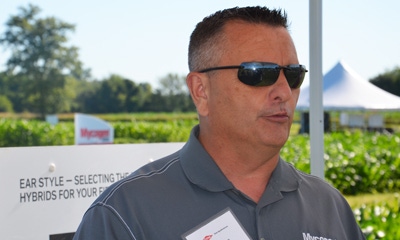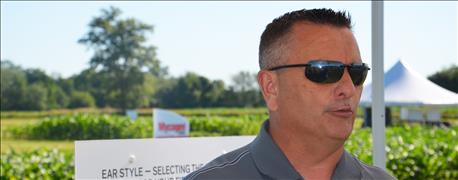
Some seed companies make gathering farm information a formal process. Others simply advise their seed sales force and support agronomists to work with customers to get as much information about each customer’s farm as possible.
John Long, Mycogen Seeds, says the goal is to match hybrids with a farmer’s operation, his or her preferences and his or her soil types.
Long says farmers seem interested in ordering seed earlier this year than ever before. Many companies will be booking seed before harvest. Your seed sales representative can make better recommendations if you have a working relationship with him or her, and if that individual knows your operation, Long says.

FARM-SPECIFIC INFO: John Long of Mycogen Seeds says his company puts lots of emphasis on matching hybrids to what works in a particular farm operation.
Dan Ritter, an agronomist with Brodbeck Seeds, says it’s a two-way street. To get the right products, you not only have to ask your seed rep questions, but you also have to supply him or her with certain pieces of information about your particular operation. If you do so, there’s a better chance your rep can work with you to get the best fit possible on each field. All hybrids are not created equal. Some work better in certain situations than others.
"Sometimes it isn’t questions you can ask, but information you can provide to your seed supplier so they can position the best products for you [that matter most],” Ritter says.
Ritter is also an Indiana Certified Crop Adviser. Here is the type of information he would want from you if you were working with him to develop a game plan for the 2017 corn crop on your farm.
— If you have unique situations on your farm, make that known to the seed dealer and document why they are unique, Ritter suggests.
— “I want to know about your preferred maturity ratings,” Ritter says. In some cases, such as if you want to hit early markets for a premium or sow cover crops after harvest, you may have differing maturity demands for different fields.
— What product characteristics are most important to you? Is it ear type, seedling vigor or just raw yield? “Rank these before you go talk to your seedsman,” Ritter suggests.
— Tillage system, soil fertility plans and more — all this information can be helpful, Ritter says. “I especially need to know how you apply nitrogen,” he notes.
— “Tell me the type of planter you have and your preferred seed grade,” Ritter says. There may be more seed available in specific grades in some hybrids compared to others.
— Explain your grain handling system, and how grain moisture affects fall harvest procedures. If you haul straight to the elevator, it may affect which hybrids are recommended versus if you dry and store on-farm. Speed of drying in your system may also influence hybrid choices, if your goal is keeping grain away from the combine.
— “Tell me about disease and weed concerns, and insect pressures,” Ritter concludes.
About the Author(s)
You May Also Like




